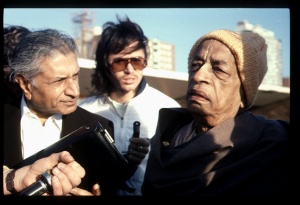SB 11.23.50

A.C. Bhaktivedanta Swami Prabhupada
Please note: The synonyms, translation and purport of this verse were composed by disciples of Śrīla Prabhupāda
TEXT 50
- janas tu hetuḥ sukha-duḥkhayoś cet
- kim ātmanaś cātra hi bhaumayos tat
- jihvāṁ kvacit sandaśati sva-dadbhis
- tad-vedanāyāṁ katamāya kupyet
SYNONYMS
janaḥ—these people; tu—but; hetuḥ—the cause; sukha-duḥkhayoḥ—of my happiness and distress; cet—if; kim—what; ātmanaḥ—for the self; ca—and; atra—in this conception; hi—indeed; bhaumayoḥ—they pertain to the material bodies; tat—that (status of being the performer and the sufferer); jihvām—the tongue; kvacit—sometimes; sandaśati—is bitten; sva—by one's own; dadbhiḥ—teeth; tat—of that; vedanāyām—in the distress; katamāya—with whom; kupyet—can one get angry.
Translation and purport composed by disciples of Śrīla Prabhupāda
TRANSLATION
If you say that these people are the cause of my happiness and distress, then where is the place of the soul in such a conception? This happiness and distress pertain not to the soul but to the interactions of material bodies. If someone bites his tongue with his own teeth, at whom can he become angry in his suffering?
PURPORT
Although bodily pleasure and pain are felt by the soul, one must tolerate such duality, understanding it to be a creation of one's own material mind. If one accidentally bites his own tongue or lip, he cannot become angry and pull out his own teeth. Similarly, all living beings are individual parts and parcels of God, and thus nondifferent from each other. All of them are meant to serve the Supreme Lord in spiritual equality. If the living beings give up their master's service and instead quarrel among themselves, they will be forced to suffer by the laws of nature. If the conditioned souls establish artificial relationships of affection based on the material body and having nothing to do with God, then time itself will destroy such relationships, and they will be subjected to further suffering. But if the individual living entities understand each other to be of the same family, all having connection with the Supreme Lord, their mutual friendship will develop. Thus one should not exhibit anger that will be harmful to oneself and others. Although the brāhmaṇa was receiving kind offerings of charity from some people and being harassed and beaten by others, he denied that these people were the ultimate cause of his happiness and distress, for he was fixed on the platform of self-realization beyond the material body and mind.